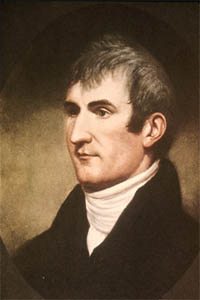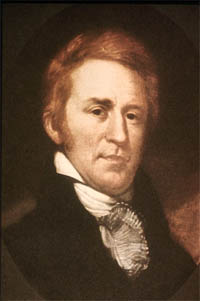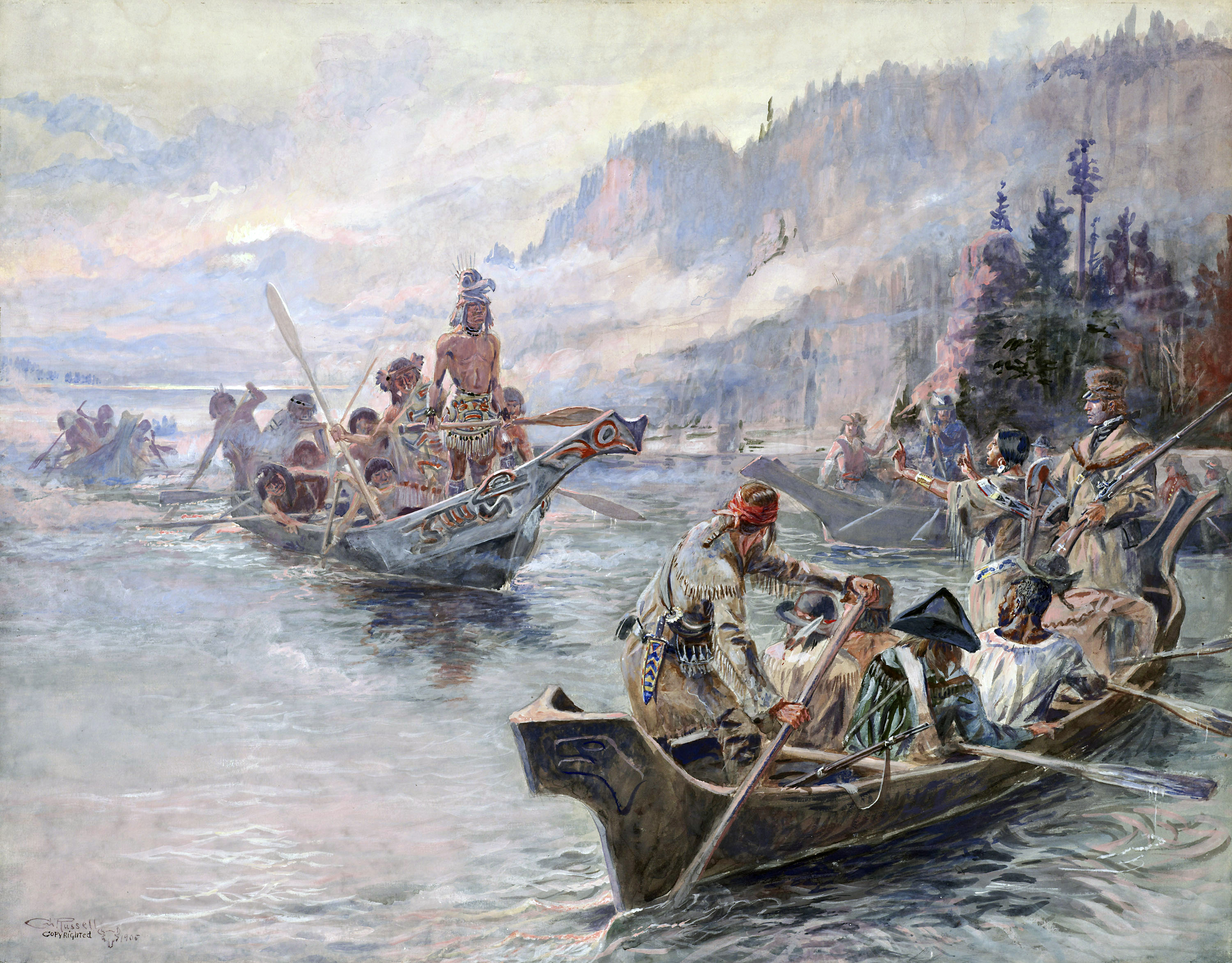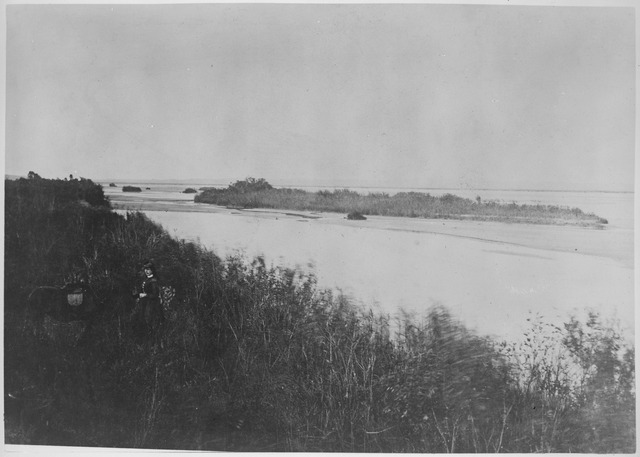Review and interview
Fallibility. After reading from Richard Wheeler’s lengthy list of historical western novels, I’m thinking fallibility is a special interest of this award-winning author. And it’s a difficult subject in a field of fiction that traditionally wants to pay tribute to the men who opened the West. In this story of Lewis and Clark, however, we are given a portrayal of exceptional men, who are also only human.
Fallibility. After reading from Richard Wheeler’s lengthy list of historical western novels, I’m thinking fallibility is a special interest of this award-winning author. And it’s a difficult subject in a field of fiction that traditionally wants to pay tribute to the men who opened the West. In this story of Lewis and Clark, however, we are given a portrayal of exceptional men, who are also only human.
Eclipse, published in 2002, tackles the story of the
suicide of Meriwether Lewis, only a few short years after the triumphant return
of his expedition to the Pacific with Will Clark. As Wheeler notes in a
Postscript, his death had long been a mystery, some historians advancing
evidence of foul play. As a close associate of Jefferson and the political camp
opposed to Aaron Burr, he would have had his enemies.
But opinion has
shifted to a belief that at the time of his death, Lewis was in fact dying of
syphilis, contracted while consorting with an Indian woman. Wheeler’s novel
begins with the return of the Corps of Discovery and follows Lewis as the
disease eventually ravages his body and mind. The novel’s considerable
achievement is that it makes of this unlikely material a wholehearted and
compelling tragedy.
 |
| Meriwether Lewis, c1807 |
In Wheeler’s hands,
it is also a personal tragedy. What destroys him as much as the disease is the
abject shame of being the host of a venereal infection. Lewis sees his hopes
and dreams torn from him, leaving him unfit for marriage and unable even to
confide in his closest friends. He is an exile, a prisoner suffering solitary
confinement. One is reminded of the stigma and the moral panic unleashed with
the first victims of the AIDS virus.
Plot. After their return to the States, Lewis and
Clark are given administrative duties over upper Louisiana. Both are based in
the former French colonial city of St. Louis. Lewis is appointed governor, and Clark
is superintendent of Indian Affairs. Both have immediate and pressing
responsibilities. Chief among them is the winning of allegiance from the many
Indian tribes even as the British, Spaniards, and others contend for control of
the vast tract of land.
 |
| William Clark, 1810 |
Meanwhile, he sets
himself unsuccessfully to winning a wife, someone not only arrestingly lovely,
but serious as he. But the few who qualify find him strangely off putting. He
exhibits a social awkwardness that may be related to his anxieties over his
unsettled health. He attributes his symptoms to “ague,” while believing himself
cured of “the pox.”
Arriving in St.
Louis, he is greeted by his second in command, a secretary named Bates, who
wants Lewis to be no more than a figurehead. A man with aspirations of his own,
Bates has intentions for the government of the territory that are in direct
opposition to Lewis’s. In time, his open hostility to Lewis produces a state of
siege between the two men. It’s a situation that mystifies Clark, who remembers
how Lewis was unreservedly loved by the men of the Corps.
Then there is the
matter of the expedition’s journals, which Lewis has promised Jefferson and the
scientific community to rush into print. His job is to edit the daily notes
taken by Clark and himself, a formidable task given the three years of the
journey. But despite Jefferson’s continued urging, he finds himself strangely
unable to even start the task.
 |
| The levee, St. Louis, 1857 |
As a man of
achievement, he is also not without ego. He has been encouraged by others to
regard himself as having potential for high office, even one day being asked to
run for president. At one point,
he considers a potential wife as being worthy of joining him some day in the
White House. And he dresses for success, spending his scant earnings as a
government employee on fancy duds.
More devastating for
him financially are his impulsive investments in real estate and other
ventures. When the fur trade
suddenly goes into recession and a stingy War Department stops paying for
expenses he has incurred as an agent of the government, he acquires a mountain
of debts. To his credit, he determines to honor them to the last dollar, but
financial ruin becomes the mirror reflection of the ruin of his mind and body.
Clark comes across as more sensible and even-tempered, his judgment more measured. He is lucky in marriage and more grounded professionally. His respect for Lewis as colleague and friend never falters. When he slowly learns the truth of the man’s condition, including his dependence on alcohol and opiates, he remains loyal and supportive.
 |
| Lewis and Clark on the Lower Columbia, 1905 |
While York believes
he has proved himself a man, worthy of his freedom, Clark regards him as no
more than a child. Now that he’s married and has increasing responsibilities,
Clark needs him more than ever, and he refuses him conjugal visits with his
wife on the home plantation. It becomes a battle of wills that parallels the
plotline between Lewis and Bates.
Structure and
style. Wheeler’s special
narrative gift is the ability to immerse us in a story about fallible men and
to make it hard to put down. One of his choices is to tell the story in the
first person, alternating between the points of view of both men. Thus, for
Lewis, we swing between his emotional highs and lows as he struggles between
fear and denial.
Also effective is
how the men narrate the story, as if reporting what has just happened, so that
events unfold for us only a beat or two after their occurrence. That has a
subtle effect, producing an uncommon sense of immediacy.
 |
| Missouri River near Omaha Indian Agency, 1869 |
Wrapping up. There is so much more packed into this novel,
it’s hard to stop writing about it. Let it be said that it’s an absorbing
account of a troubled chapter in the lives of two men who are remembered as
national heroes. It’s a reminder of how historical fact defies myth, while
demonstrating that behind the myth are living, breathing human beings with much
to praise in them despite their faults.
Eclipse is currently available at amazon and
Barnes&Noble and for kindle and the nook.
Interview
Richard Wheeler has generously agreed to spend some time here at BITS to talk about writing and the writing of his novel Eclipse. Here are his comments on the imaginative task of telling the story of Lewis and Clark and bringing the two men to life on the page.
 |
| Richard S. Wheeler |
Richard, talk about how the idea for Eclipse suggested itself to you.
In the 90s, a doctor who
lectured on the medicine of the Lewis and Clark expedition told me he had read
that Lewis had contracted syphilis, and it affected Lewis the rest of his brief
life. The doctor couldn’t remember where he had seen it. I sensed a novel, and
began a feverish hunt for the source, and after some serious looking over
several months, I found it.
An epidemiologist named Reimert
T. Ravenholt had examined the journals and concluded that Lewis had contracted
syphilis when the corps was staying with the Shoshones. Syphilis is a New World
disease, and Europeans were more vulnerable to it than native people. (Columbus
took it back to Europe, where it eventually killed a third of the people. It
was called the pox.)
Did the story come to you all
at once or was that a more complex part of the process?
I was fascinated by the swift
decline of Lewis, and the steady ascent of Clark after they got back. I
envisioned a novel that would be nothing more than the dramatizing of all that.
The expedition itself had been covered exhaustively in fiction and nonfiction,
and more was being prepared for the bicentennial by gifted historians, but it
seemed likely that a novel about the aftermath would have legs, and it did. I
was helped by the enormous literature. There was so much I finally tapered off
the research; I was writing a novel, not a new history.
Did anything about the story
or characters surprise you as you were writing?
When an historical novelist is
very lucky, he is overwhelmed with a sense of getting it right. That’s how this
evolved. As I wrote, I was occasionally filled with that euphoric sense of
capturing the period. Getting it down more or less as it happened. This was
especially true when I thought I had caught an attitude or prejudice that lay
deep within the character.
What parts of the novel gave
you the most pleasure to write?
Medicine of the period became a
fascinating subtext, crucial to the telling of the story. I immersed myself in
it, got help from doctors, learned as much as I could about diagnosis,
remedies, and also attitudes and nonscientific beliefs. (Such as the idea that
malaria rose from the “miasma” found in swamps.) Medicine governed my novel. I
learned what remedies got the expedition through three years of wilderness
travel. Native American medicine played a crucial role, too.
Did any parts of the writing
present a particular challenge?
The relationship of Clark and
his slave York was painful and difficult to depict. York was William Clark’s
boyhood playmate—and then slave. And then virtual freeman on the expedition,
and then slave again, with both men deeply antagonized. I wrote and rewrote all
that.
How much consideration did
you give to recreating the vernacular of the day?
The entire novel was narrated in
the language of the landed gentry of Virginia in the Federal period. I immersed
myself in it, both the formal and informal. The public documents of the
Founders were readily available, but the everyday speech, along with its
unspoken assumptions and habits of mind, was elusive.
There was also a need to depict
frontier and fur trade vernacular, which I absorbed through research. Once I
mastered Virginia’s way of speaking, I even began to think in it, to fashion
sentences as if they were wrought by Jefferson or Madison.
What went into the decision
to tell the story in the first person?
I depicted two very different men,
each with a lively private sensibility that didn’t always match his public
utterances. First-person is a novelist’s delight because it permits us to
follow the character’s inner convictions, motives, and secrets—and to depict
the darker and more hostile thoughts that would not otherwise see daylight.
Lewis was a very bright light,
and disease eclipsed it. The light of the foremost national hero of the time
was extinguished only three years later. It needed a subtitle, though, to make
it clear to readers.
What have been the most
interesting reactions of readers of the novel?
There was, maybe still is, a
sort of Lewis and Clark Establishment, with its own journal. It is devoted to
polishing the escutcheon of its heroes. Its magazine reviewed my book dourly,
plainly unhappy with my depiction of Lewis and his fate. But an odd thing
happened in the succeeding years. That Lewis contracted syphilis on the trip is
now the established version of events, as far as I can tell. Historians who
scorned the idea are now open to it.
There has always been
controversy about Lewis’s death—murder or suicide? Recently two young
historians published a work flatly stating that it was murder, done by the
family that ran Grinder’s Stand, where it all played out. They make a
compelling case, according to the reviews.
The descendents of Lewis are
open to exhuming his bones, which would give us multiple clues, but the
National Park Service forbids it. If the bones were loaded with mercury, for
instance, that would be evidence of dosing for syphilis. The trajectory of the
ball that entered Lewis’s skull might reveal much.
What are you reading now?
I just finished Loren Estleman’s
splendid historical novel, The Confessions of Al Capone.
What can your readers expect
from you next?
I’m starting on an historical
novel about an early vaudeville troupe touring 1880s Montana mining towns, such
as Helena and Butte.
Anything we didn’t cover
you’d like to comment on?
I want to thank you for your
truly remarkable and penetrating review of
the novel. You went straight to
the heart of my work, and I marveled as
I read it.
Thanks, Richard. Every success.
Further reading: BITS reviews of other
novels by Richard Wheeler
Image credits: Wikimedia Commons
Coming up: Guy Vanderhaeghe, The Last Crossing


Fascinating. They have always interested in me and this review and interview spark my interest even more.
ReplyDeleteThe Ken Burns documentary piqued my interest, and seeing it again recently I noted that it's only a superficial treatment of a complex story.
DeleteThanks for this review and interview. I'm always interested in reading about the fiction of Richard Wheeler.
ReplyDeleteA couple more reviews are coming: BADLANDS and SIERRA.
DeleteDisease tears things apart, whether physical or mental. In the end it comes down to that it seems.
ReplyDeleteDisease overlaid with shame is the more thoroughly destructive.
DeleteEnjoyed Mr. Wheeler's observation about his research and "writing a novel, not a new history." Tricky to draw the line at the right juncture
ReplyDeleteHaving tried it myself, I can concur totally.
DeleteI have read six or seven of Mr. Wheeler’s novels and enjoyed them all. This one seems especially interesting to this old western history teacher. I will have this one on my Kindle by the end of the day. Thanks for pointing me toward another good read.
ReplyDeleteRon and all my colleagues in the field of western literature, thank you so much for the review and commentary. You people are the authorities and scholars of the West, and it pleases me that my work passed muster.
ReplyDeleteI have read this book three times and each time I come away with some new insight in the expedition. I have been collecting Mr Wheeler's book over many years and find his writing clever, informative, and factual, his is a great talent. I feel his Mr Skye series a good read with incites of truth about those time interesting. My thanks to him.
ReplyDelete